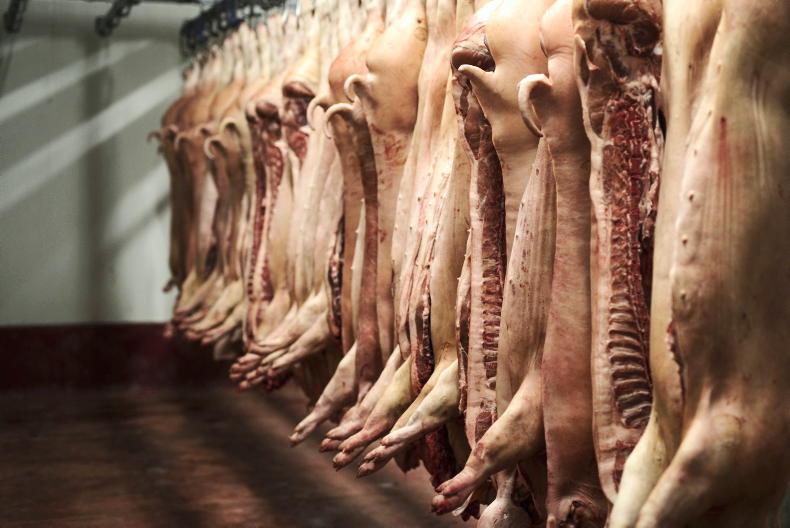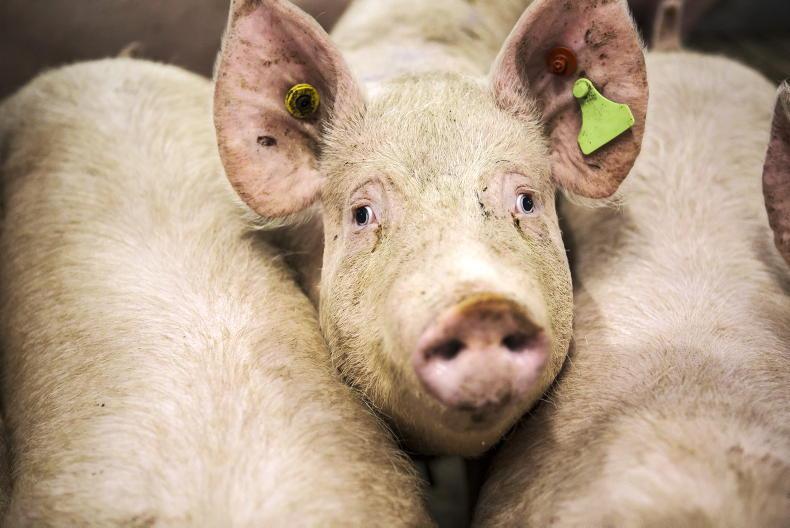Some 800 pork butchers will be eligible to apply for temporary visas which will allow them to travel and work in the UK for a period of six months.
The latest Department of Environment Food and Rural Affairs (Defra) figures show that pig slaughtering in September was down 13% on the same period last year at 792,000 head, 137,000 fewer than September 2020.
Defra has introduced other measures to help ease the pressures on the pig sector in the UK, as staff shortages, particularly of skilled butchers, has badly hampered processing plants.
It has announced that it will fund a private storage aid scheme in England, which will enable meat processors to store slaughtered pigs for three to six months so that they can be preserved safely and processed at a later date.
Levy holiday
There will be a pork levy holiday for the month of November, which will suspend payments of the levy pig farmers and producers are required to pay.
This will amount to savings for the sector of just under £1m.

The removal of the pork levy will amount to savings of around £1 million for the sector.
It also work with industry to introduce processing of animals on Saturdays and longer working days where possible.
However, it has said the temporary visas are not a long-term solution and businesses must make long-term investments in the UK domestic workforce to build a high-wage, high-skill economy, instead of relying on overseas labour.
It expects the pork sector to encourage better training offers, career options and wage increases
It stressed that it expects the pork sector to encourage better training offers, career options and wage increases to ensure that the sector draws on the large domestic labour pool in the UK, as well as investing in technology across the industry.
The UK government took the decision in response to the continued build-up of pigs on farms, falling prices and high production costs.
The labour issues in processing plants has seen some processors cut back on pig numbers by about 25% per week since August.
Backed up
The National Pig Association (NPA) estimates that between 120,000 and 150,000 pigs are currently backed up on British farms.
The NPA is aware of around 6,600 healthy pigs that have been culled and disposed of to ease space pressures on farms.
It said the situation on farms is highlighted by the rapid rise in average carcase weights.
Figures show that, in early October, UK average carcase weights stood at just short of 91kg.
That is 4kg above 2020 levels and more than 4.5kg above the average in early August.
However, the industry reports that these visas are well below what the sector requires to sustain adequate production.
NPA chief executive Zoe Davies said: “This really is just the beginning of the process and we have a long way to go before we can say the crisis is over. The situation on many farms is still critical so we must not stop now.
“We will keep a close eye on how the measures are implemented and will also look to ensure the financial burden of clearing the backlog is shared evenly across the supply chain.”
Some 800 pork butchers will be eligible to apply for temporary visas which will allow them to travel and work in the UK for a period of six months.
The latest Department of Environment Food and Rural Affairs (Defra) figures show that pig slaughtering in September was down 13% on the same period last year at 792,000 head, 137,000 fewer than September 2020.
Defra has introduced other measures to help ease the pressures on the pig sector in the UK, as staff shortages, particularly of skilled butchers, has badly hampered processing plants.
It has announced that it will fund a private storage aid scheme in England, which will enable meat processors to store slaughtered pigs for three to six months so that they can be preserved safely and processed at a later date.
Levy holiday
There will be a pork levy holiday for the month of November, which will suspend payments of the levy pig farmers and producers are required to pay.
This will amount to savings for the sector of just under £1m.

The removal of the pork levy will amount to savings of around £1 million for the sector.
It also work with industry to introduce processing of animals on Saturdays and longer working days where possible.
However, it has said the temporary visas are not a long-term solution and businesses must make long-term investments in the UK domestic workforce to build a high-wage, high-skill economy, instead of relying on overseas labour.
It expects the pork sector to encourage better training offers, career options and wage increases
It stressed that it expects the pork sector to encourage better training offers, career options and wage increases to ensure that the sector draws on the large domestic labour pool in the UK, as well as investing in technology across the industry.
The UK government took the decision in response to the continued build-up of pigs on farms, falling prices and high production costs.
The labour issues in processing plants has seen some processors cut back on pig numbers by about 25% per week since August.
Backed up
The National Pig Association (NPA) estimates that between 120,000 and 150,000 pigs are currently backed up on British farms.
The NPA is aware of around 6,600 healthy pigs that have been culled and disposed of to ease space pressures on farms.
It said the situation on farms is highlighted by the rapid rise in average carcase weights.
Figures show that, in early October, UK average carcase weights stood at just short of 91kg.
That is 4kg above 2020 levels and more than 4.5kg above the average in early August.
However, the industry reports that these visas are well below what the sector requires to sustain adequate production.
NPA chief executive Zoe Davies said: “This really is just the beginning of the process and we have a long way to go before we can say the crisis is over. The situation on many farms is still critical so we must not stop now.
“We will keep a close eye on how the measures are implemented and will also look to ensure the financial burden of clearing the backlog is shared evenly across the supply chain.”







 This is a subscriber-only article
This is a subscriber-only article










SHARING OPTIONS: